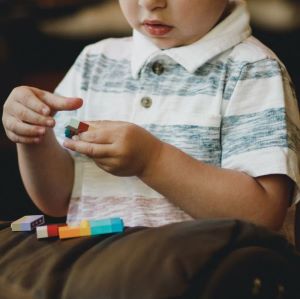Play Therapy

Is Play Therapy Right for Your Child?
Children experience a range of complex emotions, especially if they are exposed to traumatic experiences or significant changes in their environment. However, children may not be able to express their emotions or articulate different experiences to adults. Play therapy helps to bridge the gap in communication skills between children and adults, allowing children to express themselves in ways that come more naturally.
What happens in play therapy?
To the average observer, play therapy may simply look like normal playtime. However, play therapy allows trained therapists to observe how children interact with different toys and tools, as well as take note of how a child’s behavior changes when parents are present and when they leave the room. Play therapy also integrates strategies like creative storytelling, roleplaying, drawing, and creative movement, which can offer further insight on the child’s feelings and experiences.
During playtime, children feel safe and at ease, so there is a greater opportunity for them to act out their deeper feelings and learn how to communicate more effectively with a trusted adult. Play therapy may be guided by the therapist, who may direct the child to specific modes of play, or it may be freeform, with the child choosing which toys or activities they want to interact with.
Who can benefit from play therapy?
Play therapy is best suited to young children who may not be able to participate in conventional talk therapy due to limited language skills. Children with behavioral problems and those coping with trauma related to abuse, abandonment, natural disasters, family crises, and parental divorce often benefit from play therapy. Additionally, play therapy can address mental health disorders like anxiety, ADHD, autism spectrum disorders, and learning disabilities.
What are the benefits of play therapy?
Like other forms of therapy, a primary focus of play therapy is developing coping and communication strategies, which can strengthen personal relationships and improve social skills. Throughout play therapy, your child may learn to be accountable for certain behaviors, cope with negative emotions like anger and grief in healthier ways, gain empathy for others, and build self-esteem. According to Play Therapy International, 71% of children who participate in play therapy will show a positive change in their behavior.
Getting Started With Play Therapy
If your child is experiencing behavioral issues, consulting with your pediatrician is a good first step. Your pediatrician can rule out medical causes for behavioral changes and guide you toward the appropriate resources for mental health care. Here at Integrated Behavioral Health, we can provide a safe, welcoming environment for your child to participate in play therapy.
